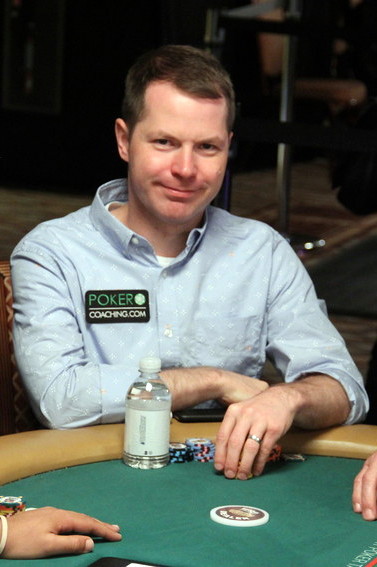






How To Survive A Coolerby Jonathan Little | Published: May 15, 2024 |
|
|
 If you want to increase your poker skills and learn to crush the games, check out Jonathan Little’s elite training site at PokerCoaching.com/CardPlayer.
If you want to increase your poker skills and learn to crush the games, check out Jonathan Little’s elite training site at PokerCoaching.com/CardPlayer.
I recently played a hand on the second day of a $1,500 buy-in poker tournament where I decided to play cautiously with pocket kings, which resulted in me not going broke. It was a situation where many other players would have, but by playing the hand that way, it allowed me to stay in the tournament and continue grinding out my expected value.
With blinds at 500-1,000, I raised to 2,400 out of my 200,000 stack from first position with K K
K . The player in the lojack, a somewhat tight, straightforward player who seemed to be in line, thought for a while, messed around with his chips in an odd way, then three-bet to 6,300 out of his 130,000 stack.
. The player in the lojack, a somewhat tight, straightforward player who seemed to be in line, thought for a while, messed around with his chips in an odd way, then three-bet to 6,300 out of his 130,000 stack.
I learned from Zach Elwood’s chapter in my book Excelling at No-Limit Hold’em that when people take a long time and then act in a somewhat bizarre manner, that they usually have an abnormally strong range.
While K-K is obviously a strong value hand, I decided to call just in case I happened to be against A-A.
The flop came 10 7
7 4
4 . I checked and my opponent checked behind.
. I checked and my opponent checked behind.
At this point, I assumed his range was mostly A-K, A-Q, and various other unpaired hands. He could have overpairs, but I assumed he would continuation bet those for value. He could also have sets, 10-10 and 7-7, but there are very few combinations of those hands, plus I thought he would value bet those as well. Some other hands he could check behind include A-10, J-10, and 9-9, although I did not think he would make a preflop three-bet with those.
The turn was the 8 . Because I thought my opponent’s range was mostly worse made hands and unpaired hands, I bet 6,500 into the 14,900 pot. Much to my surprise, my opponent quickly raised to 20,000.
. Because I thought my opponent’s range was mostly worse made hands and unpaired hands, I bet 6,500 into the 14,900 pot. Much to my surprise, my opponent quickly raised to 20,000.
I was not sure what to make of my opponent’s range at this point, but I thought he may be trying to “buy” a free showdown with a hand like J-J or A-10. I thought he may have also viewed my small turn bet as weak, which of course is not the case because I would make that same turn bet size with all the holdings I wanted to bet.
All of this led me to call. Notice reraising the turn has no merit because if I happen to be against A-A or a set, I want to minimize my losses.
The river was the 3 . I checked and my opponent immediately checked behind. I assumed I won against a worse overpair, top pair, or a random bluff, but my opponent proudly tabled A-A after seeing my K-K.
. I checked and my opponent immediately checked behind. I assumed I won against a worse overpair, top pair, or a random bluff, but my opponent proudly tabled A-A after seeing my K-K.
If my opponent had bet the river instead of checking, I would have certainly called because I was wary that my small turn bet may have induced him to bluff or overvalue a worse made hand.
In tournaments filled with mostly recreational players, you will find that a large portion of your win rate comes from your opponents’ poor plays, not your own great plays. While I minimized my losses by just calling my opponent’s preflop three-bet, my opponent made a huge blunder by not betting every street.
Especially in main events full of recreational poker players, it is important to minimize your losses in cooler situations in order to give your opponents additional opportunities to make errors against you in the future.
If you want more resources to help you improve your game, I put together a course called Master the Fundamentals. This course covers the basics, preflop, post-flop, multiway, turn and river strategy, and much more. This course is completely free inside Card Player Poker School!
When you join the Card Player Poker School (it’s free to join), you’ll also get:
 Jonathan Little is a two-time WPT winner and the 2024 PokerGO Cup champion with nearly $9 million million in live tournament earnings, best-selling author of 15 educational poker books, and 2019 GPI Poker Personality of the Year. If you want to increase your poker skills and learn to crush the games, check out his training site at PokerCoaching.com/cardplayer.
Jonathan Little is a two-time WPT winner and the 2024 PokerGO Cup champion with nearly $9 million million in live tournament earnings, best-selling author of 15 educational poker books, and 2019 GPI Poker Personality of the Year. If you want to increase your poker skills and learn to crush the games, check out his training site at PokerCoaching.com/cardplayer.
Features
Tournaments
Strategy
Commentary & Analysis